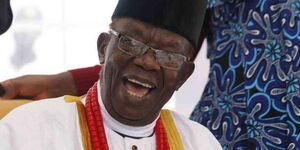The Inspector General (IG) of Police, Douglas Kanja and the Attorney General, on Wednesday, October 22, threw their weight behind the petition challenging the process of hiring 10,000 new officers.
Kanja and AG Dorcas Oduor supported the petition by former Member of Parliament Harun Mwau, which had challenged the role of the National Police Service Commission (NPSC) in the recruitment exercise.
The IG and the AG supported Mwau’s contention that the role of recruitment was the function of the Inspector General and not that of the Commission.
Mwau insisted that the power to recruit police constables lay solely within the command-and-control structure of the Inspector General, as provided under Article 245 of the Constitution.
While supporting his position, the two senior officials argued that the Commission’s attempt to manage recruitment interfered with the internal operations of a national security organ and threatened the unity of command essential for an effective police force.
While challenging the recruitment, Mwau cited the National Police Service Commission (Recruitment and Appointment) Regulations, 2025, which he wanted to be declared unconstitutional.
He maintained that the new regulations unlawfully expanded the powers of the Commission and violated Article 2(4) of the Constitution, rendering any law inconsistent with the Constitution invalid.
While siding with Mwau, the AG wanted the court to interpret Articles 238, 239, 244, 245, and 246 of the Constitution in a manner that preserves police independence and discipline within the service.
On his part, the IG emphasised the distinction between the roles of the IG and the Commission. He argued that the Constitution granted the Inspector General the power to employ, promote, suspend, and dismiss members of the service, while the Commission’s role is limited to civilian staff appointments.
In response, NPSC brought up the aspect of judicial jurisdiction, positing that the Environment and Labour Relations Court (ELRC), where the petition was filed, did not have the jurisdiction to handle the case.
The Commission argued that under Section 12(1) of the Employment and Labour Relations Court Act and Article 162(2) of the Constitution, the court’s mandate is limited to disputes arising out of employment and labour relations.
It argued that the police recruitment exercise did not constitute such a dispute but instead concerns matters of national security administration and constitutional interpretation relating to Articles 238 to 260.
As a result, NPSC contended that the issues raised in the petition touch on the constitutional functions of the Inspector General, the National Police Service, and the Commission, including promotion, discipline, payroll, and human resource management, and fall under the jurisdiction of the High Court under Article 165.
The ELRC in Nairobi had on Thursday, October 2, 2025, issued a temporary order halting the recruitment, which was scheduled to begin on Friday, October 3, 2025.
The ruling was delivered by Lady Justice Hellen Wasilwa, pending a full hearing and determination of the petition.












